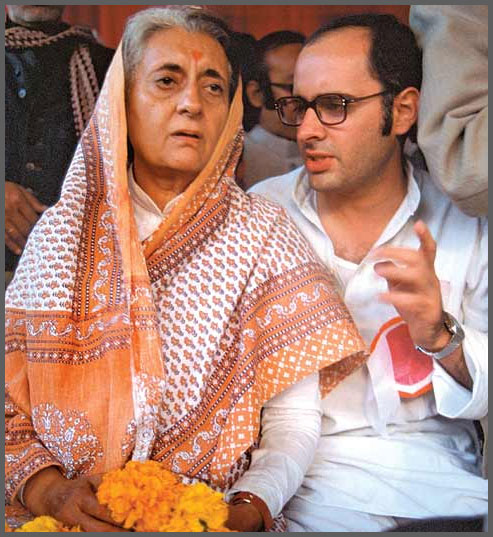37 years since Emergency: Is it all okay today?
Democracies around the globe, particularly of the developing world, have time and again faltered against strong dictatorial advancements. Most of the countries in Africa, Asia and Latin America have experienced, some time or the other, a short or long-time suspension of democratic systems by ambitious despots, mainly belonging to the army. India is perhaps the only country in the world which never saw any coup toppling its civilian government in its 65 years of independence, which makes its claim to be a viable democracy all the more strong. But the Indian record is not flawless, either.
Tainted democracy
Thirty-seven years ago, on this day, started a agonising twenty-one month journey during when the country’s acclaimed democratic ethos were buried. And it was not any coup orchestrated by either the army or the judiciary. India’s parliamentary democracy was crippled by a popularly-elected government led by Indira Gandhi, daughter of the great Jawaharlal Nehru, the man who always championed the cause of democratic ideals.
On the night of June 25, 1975, President Fakhruddin Ali Ahmed on the advice of Prime Minister Gandhi had declared a ‘National Emergency’. It is believed that the PM took the extreme step on the suggestion of some of her party leaders after the Allahabad High Court had nullified her electoral victory in 1971 on grounds that she had misused the government machinery for her election campaign. The ruling Congress had justified the emergency saying it was necessary for India was facing an alarming internal agitation. Anti-Gandhi leaders had been protesting in those times demanding a change of guard in New Delhi.
Mother-son duo go on the rampage
Those were dark years for India. The country’s press was censored (Doordarshan and AIR were only airing state news) while opposition leaders were arrested. Public freedom was curtailed and elections were postponed. Slums were demolished and even people were killed during forced resettlement efforts. The ‘authoritarian’ PM took help of the President’s office to implement extraordinary laws (ordinances) which bypassed the Parliament.
The draconian 42nd Amendment to the Constitution was brought to ensure that Indira Gandhi’s political onslaught could not be interrupted by establishing the Parliament’s supremacy over other wings of the government. The court’s powers were reduced. During the emergency, Indira’s younger son, Sanjay Gandhi, also executed a birth control programme by force whereby men were lifted and made to undergo vasectomy. The RSS was banned and many of its leaders went underground. Even many Communist leaders were arrested.
Indira Gandhi ousted…
On January 23, 1977, the PM declared fresh elections and the Emergency was lifted two months later. All leaders were released from jail. The opposition was in tatters in terms of organisation and finance. Yet, various anti-Congress parties joined hands to form the Janata Party which trounced Indira Gandhi’s Congress in the polls. Both Indira Gandhi and her son Sanjay were defeated in their respective seats.
..and back
The Janata government led by Morarji Desai had appointed the Shah Commission to inquire into the atrocities committed during the Emergency but despite the submission of reports by the commission, nothing actually materialised for the Janata government did not continue for long owing to internal differences and within three years, Indira Gandhi was back at the helm. The Shah Commission report was subsequently removed from the public domain. The PM had sought apologies from the country men about the excesses being committed during her previous stint.
Looking back at the Emergency
History has taken many twists and turns in the last 37 years. Scholars today divide the post-independence history of India into two parts with the year 1975 as the dividing line. Considered a blot on the nation’s otherwise clean democratic record, the Emergency is still a subject of evaluation.
Emergency not just a political battle
According to some observers, the Emergency was the first symptom in the post-independence India about the crisis that was gradually engulfing its political institutions. P N Dhar, who had once served the Principal Secretary to Indira Gandhi felt the Emergency was a consequence of the failure in the country’s political system. It is not that the authoritarian ambitions of Gandhi had taken over in those days. The Emergency was a response to a crisis which was not confined to the political sphere.
Various reasons
It was created by the ill-effects of a major preceding war, economic woes, drought, global oil crisis leading to inflation. India had never witnessed such a challenging situation since 1947 and the rulers were really cornered to solve the impending crisis with structural acumen. So, the easier way out was to go on the offensive and silent all dissenting voices and extend what could have been a threatened mandate. Indira Gandhi was no F D Roosevelt to have caught the bull by its horn as the latter had done during the Great Depression in the US. For a populist leader like her, the short-cut way was the more effective one.
Decline of the Congress
The Emergency also hastened the decline of the Congress, which till the 30th year since Independence, was an unchallenged political force. The year 1977 was a watershed again which marked the fall of the homogenous political culture. True, Rajiv Gandhi had led a majority government between 1984-89 riding the sympathy wave after Indira’s assassination, but still it was the end days of the party’s supremacy in Indian politics. Hence, the Emergency in a way had paved way for other political forces in the country, particularly the far right Hindutva elements. In the next 15 years after the Emergency was withdrawn, India was to see the far-right forces reaching their peak and significantly affecting the discourse of national politics.
Gandhis’ only not responsible
No The Gandhis alone were not responsible for the Energency. Names like Siddhartha Shankar Ray, the former chief minister of West Bengal, whose regime was known for its notoriety for handling the extremist problem in the mid-1970s were equally relevant. We should not spare the opposition leaders at the time who, by means of attacking Indira Gandhi, were promoting an anarchy. Many scholars believe the Emergency was a tragic outcome of the clash between JP Narayan’s ‘quest’ for anarchy and Indira Gandhi’s push for authoritarianism. The institutions which had also made India a proud democracy till then also did not raise a protest and simply toed the diktats.
Different yet similar
For today’s generation, 1975 is a distant year but the prospects of Emergency may not be. The 1975 Emergency was a structural one, orchestrated by an ambitious individual. In 2012, the situation is vastly dissimilar. We have a multi-party and fragmented polity today, so much so that we might not have a strong, centralised leadership again as was in the non-coalition government days. The prime minister’s office is a weakened institution today. Our financial fortunes are better than what it was in the pre-liberalisation period, despite a falling rupee in recent times. Media are much stronger today and so are other constitutional bodies. Yet, the Indian way of life is often hit by anarchical tendencies. A big concern is that autonomy of many of the institutions which took a beating during the Emergency and the authoritarian culture were not restored even in the subsequent times. Thus, one wonders whether these differences ensure that we would not face consequences like those of the Emergency again? There is no scope for complacency in Indian politics.
source by thatstelugu












